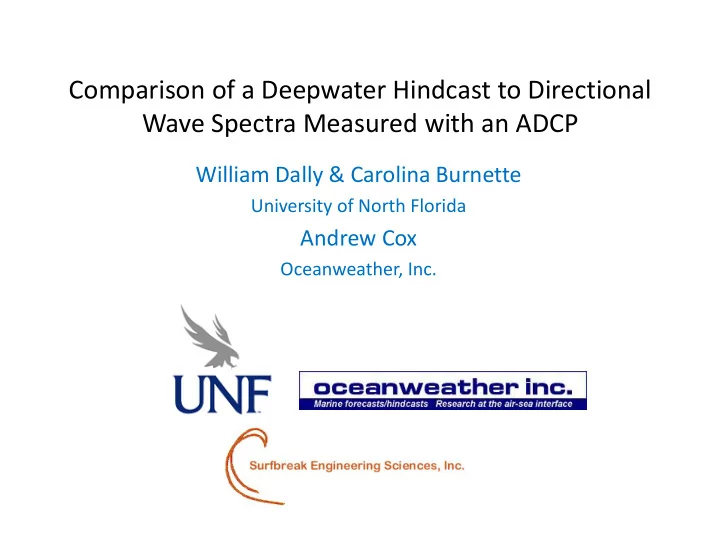

Comparison of a Deepwater Hindcast to Directional Wave Spectra Measured with an ADCP William Dally & Carolina Burnette University of North Florida Andrew Cox Oceanweather, Inc.
Outline 1. Motivation 2. The Experiment of Opportunity: MSC vs. ADCP 3. Basic Observations 4. Time Series of Frequency Spectra 5. Time Series of Directional Distributions 6. Spot Checks 7. Averaged Results 8. Conclusions & Future Work
Motivation
MSC 6914 ~ 24 km Depth contours in meters
Motivation: Long-term nearshore wave climate
S xy /S xy ( max )
The Experiment of Opportunity
30 km
24.5 m depth 1200 kHz
Basic Parameter Observations – Deployment #1
Basic Parameter Observations – Deployment #2
MSC vs. ADCP Spectral Parameters
Time Series of Frequency Spectra
Time Series of Directional Distributions
Spot Checks – Frequency Spectra 1 2 3 4 5 6 1 2 3 4 5 6
7 8 9 10 11 12 7 8 9 10 11 12
Spot Checks – Directional Distributions 4 1 2 3 5 6 1 2 3 4 5 6
7 8 9 10 11 12 7 8 9 11 12 10
Average of all Spectra ADCP MSC
Conclusions & Future Work 1. The comparison of deepwater hindcasts to high-fidelity ADCP measurements is encouraging. 2. Wave measurement technology/methodology has potentially outpaced modeling capabilities (good!). 3. The ADCP enables much greater directional resolution than can be obtained with buoys. Spectral spreading due to wave-wave interactions can be studied with greater confidence.
Recommend
More recommend